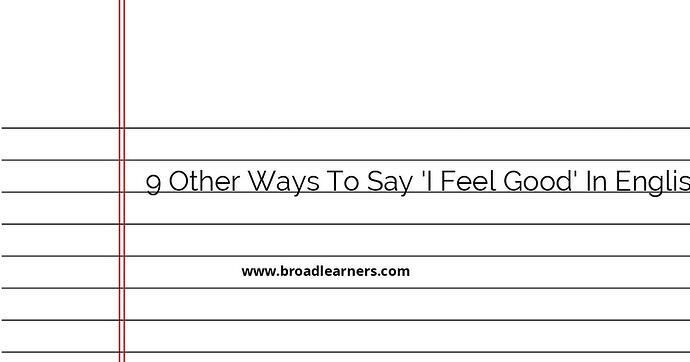Expressing how you feel good is a great way to communicate your positive emotions. However, using the same phrase all the time can become repetitive. This article presents nine alternative ways to say 'I feel good' in English:
- I feel great
- I am in a good mood
- I am feeling fantastic
- I am on top of the world
- I am thrilled
- I am elated
- I am overjoyed
- I am ecstatic
- I am delighted
Each alternative phrase conveys a slightly different level of happiness and excitement. Let's explore these alternatives in more detail:
1. I feel great
'I feel great' is a simple and straightforward way to express that you are feeling good. It indicates a positive state of mind and overall well-being. You can use this phrase in various situations, such as when someone asks how you're doing or when you want to share your happiness with others. For example:
Friend: How are you today?
You: I feel great! I had a productive day at work and accomplished my goals.
2. I am in a good mood
When you say 'I am in a good mood,' you are specifically referring to your emotional state. It implies that you are feeling positive, happy, and optimistic. This phrase is commonly used to describe your attitude towards a particular situation or event. Here's an example:
Colleague: Why are you smiling so much today?
You: I am in a good mood because I received some great news this morning.
3. I am feeling fantastic
'I am feeling fantastic' conveys a high level of enthusiasm and excitement. It suggests that you are not only feeling good but also experiencing a sense of euphoria or extreme happiness. You can use this phrase when something extraordinary or wonderful has happened to you. For instance:
Family member: What's with the big smile on your face?
You: I am feeling fantastic! I just got accepted into my dream university.
4. I am on top of the world
'I am on top of the world' indicates a feeling of immense happiness and satisfaction. It suggests that you are experiencing a peak moment in your life and everything is going exceptionally well. This phrase is often used to express a sense of achievement or success. Here's an example:
Friend: How do you feel after winning the championship?
You: I am on top of the world! It's such an incredible accomplishment for me and my team.
5. I am thrilled
When you say 'I am thrilled,' you are expressing an intense feeling of excitement and joy. It implies that something has happened that has exceeded your expectations and made you extremely happy. This phrase can be used to describe your reaction to a pleasant surprise or a positive outcome. For example:
Partner: Guess what? I planned a surprise vacation for us!
You: Oh, I am thrilled! That's so thoughtful of you.
6. I am elated
'I am elated' expresses a state of extreme happiness and jubilation. It suggests that you are overjoyed and filled with intense positive emotions. This phrase is often used to describe a reaction to extraordinary news or an incredibly joyful event. Here's an example:
Sibling: You won the lottery? How do you feel?
You: I am elated! It's like a dream come true.
7. I am overjoyed
'I am overjoyed' conveys a sense of overwhelming happiness and delight. It indicates that you are filled with immense joy and cannot contain your excitement. This phrase is commonly used to express extreme pleasure or happiness. For instance:
Friend: Look at the smile on your face! What's the reason?
You: I am overjoyed! I just received the job offer I've been dreaming of.
8. I am ecstatic
'I am ecstatic' suggests that you are experiencing an intense and overwhelming level of happiness and excitement. It implies that you are beyond thrilled and filled with extreme joy. This phrase can be used to describe your reaction to something extraordinary or highly anticipated. Here's an example:
Colleague: How do you feel about your promotion?
You: I am ecstatic! It's a huge milestone in my career.
9. I am delighted
'I am delighted' expresses a state of genuine pleasure and happiness. It suggests that you are pleasantly surprised and deeply satisfied. This phrase is often used to describe your reaction to something unexpected or enjoyable. For example:
Family member: We have a surprise for you!
You: Oh, I am delighted! I can't wait to find out what it is.
These alternative phrases provide you with a variety of ways to express your positive emotions and convey your happiness. Feel free to use them in different situations to add more variety and richness to your language.
Did I miss anything? Respond below
